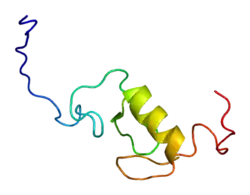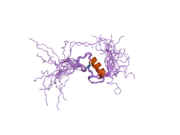PCGF6
Polycomb group RING finger protein 6 is a protein that in humans is encoded by the PCGF6 gene.[5][6]
| PCGF6 | |||||||||||||||||||||||||||||||||||||||||||||||||||
|---|---|---|---|---|---|---|---|---|---|---|---|---|---|---|---|---|---|---|---|---|---|---|---|---|---|---|---|---|---|---|---|---|---|---|---|---|---|---|---|---|---|---|---|---|---|---|---|---|---|---|---|
 | |||||||||||||||||||||||||||||||||||||||||||||||||||
| |||||||||||||||||||||||||||||||||||||||||||||||||||
| Identifiers | |||||||||||||||||||||||||||||||||||||||||||||||||||
| Aliases | PCGF6, MBLR, RNF134, polycomb group ring finger 6 | ||||||||||||||||||||||||||||||||||||||||||||||||||
| External IDs | OMIM: 607816 MGI: 1918291 HomoloGene: 12378 GeneCards: PCGF6 | ||||||||||||||||||||||||||||||||||||||||||||||||||
| |||||||||||||||||||||||||||||||||||||||||||||||||||
| |||||||||||||||||||||||||||||||||||||||||||||||||||
| |||||||||||||||||||||||||||||||||||||||||||||||||||
| |||||||||||||||||||||||||||||||||||||||||||||||||||
| Wikidata | |||||||||||||||||||||||||||||||||||||||||||||||||||
| |||||||||||||||||||||||||||||||||||||||||||||||||||
The protein encoded by this gene contains a RING finger motif, which is most closely related to those of polycomb group (PcG) proteins RNF110/MEL-18 and BMI1. PcG proteins are known to form protein complexes and function as transcription repressors. This protein has been shown to interact with some PcG proteins and act as a transcription repressor. The activity of this protein is found to be regulated by cell cycle dependent phosphorylation. Alternatively spliced transcript variants encoding different isoforms have been identified.[6]
References
- GRCh38: Ensembl release 89: ENSG00000156374 - Ensembl, May 2017
- GRCm38: Ensembl release 89: ENSMUSG00000025050 - Ensembl, May 2017
- "Human PubMed Reference:". National Center for Biotechnology Information, U.S. National Library of Medicine.
- "Mouse PubMed Reference:". National Center for Biotechnology Information, U.S. National Library of Medicine.
- Akasaka T, Takahashi N, Suzuki M, Koseki H, Bodmer R, Koga H (Aug 2002). "MBLR, a new RING finger protein resembling mammalian Polycomb gene products, is regulated by cell cycle-dependent phosphorylation" (PDF). Genes Cells. 7 (8): 835–50. doi:10.1046/j.1365-2443.2002.00565.x. hdl:2027.42/72663. PMID 12167161. S2CID 23060582.
- "Entrez Gene: PCGF6 polycomb group ring finger 6".
Further reading
- Kanno M, Hasegawa M, Ishida A, et al. (1996). "mel-18, a Polycomb group-related mammalian gene, encodes a transcriptional negative regulator with tumor suppressive activity". EMBO J. 14 (22): 5672–8. doi:10.1002/j.1460-2075.1995.tb00254.x. PMC 394682. PMID 8521824.
- Trimarchi JM, Fairchild B, Wen J, Lees JA (2001). "The E2F6 transcription factor is a component of the mammalian Bmi1-containing polycomb complex". Proc. Natl. Acad. Sci. U.S.A. 98 (4): 1519–24. doi:10.1073/pnas.041597698. PMC 29289. PMID 11171983.
- Suzuki M, Mizutani-Koseki Y, Fujimura Y, et al. (2002). "Involvement of the Polycomb-group gene Ring1B in the specification of the anterior-posterior axis in mice". Development. 129 (18): 4171–83. doi:10.1242/dev.129.18.4171. PMID 12183370.
- Strausberg RL, Feingold EA, Grouse LH, et al. (2003). "Generation and initial analysis of more than 15,000 full-length human and mouse cDNA sequences". Proc. Natl. Acad. Sci. U.S.A. 99 (26): 16899–903. Bibcode:2002PNAS...9916899M. doi:10.1073/pnas.242603899. PMC 139241. PMID 12477932.
- Ota T, Suzuki Y, Nishikawa T, et al. (2004). "Complete sequencing and characterization of 21,243 full-length human cDNAs". Nat. Genet. 36 (1): 40–5. doi:10.1038/ng1285. PMID 14702039.
- Deloukas P, Earthrowl ME, Grafham DV, et al. (2004). "The DNA sequence and comparative analysis of human chromosome 10". Nature. 429 (6990): 375–81. Bibcode:2004Natur.429..375D. doi:10.1038/nature02462. PMID 15164054.
- Gerhard DS, Wagner L, Feingold EA, et al. (2004). "The status, quality, and expansion of the NIH full-length cDNA project: the Mammalian Gene Collection (MGC)". Genome Res. 14 (10B): 2121–7. doi:10.1101/gr.2596504. PMC 528928. PMID 15489334.
- Rual JF, Venkatesan K, Hao T, et al. (2005). "Towards a proteome-scale map of the human protein-protein interaction network". Nature. 437 (7062): 1173–8. Bibcode:2005Natur.437.1173R. doi:10.1038/nature04209. PMID 16189514. S2CID 4427026.
- Zhong N, Radu G, Ju W, Brown WT (2006). "Novel progerin-interactive partner proteins hnRNP E1, EGF, Mel 18, and UBC9 interact with lamin A/C". Biochem. Biophys. Res. Commun. 338 (2): 855–61. doi:10.1016/j.bbrc.2005.10.020. PMID 16248985.
- Lee MG, Norman J, Shilatifard A, Shiekhattar R (2007). "Physical and functional association of a trimethyl H3K4 demethylase and Ring6a/MBLR, a polycomb-like protein". Cell. 128 (5): 877–87. doi:10.1016/j.cell.2007.02.004. PMID 17320162. S2CID 6519228.
This article is issued from Wikipedia. The text is licensed under Creative Commons - Attribution - Sharealike. Additional terms may apply for the media files.




